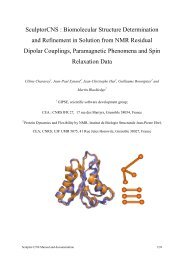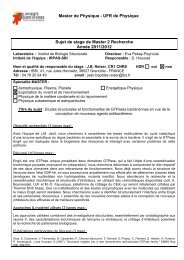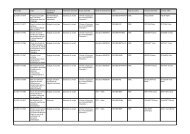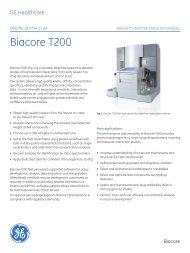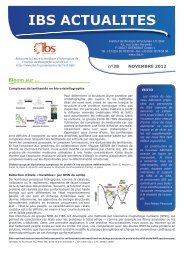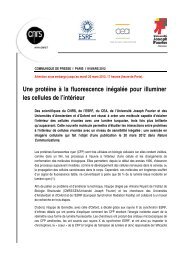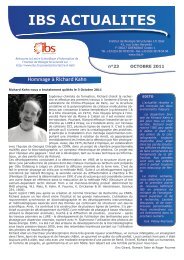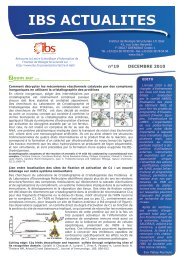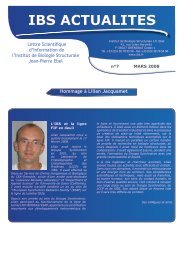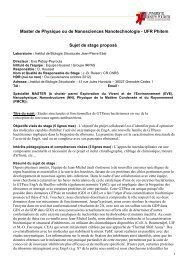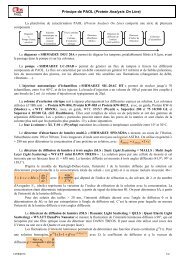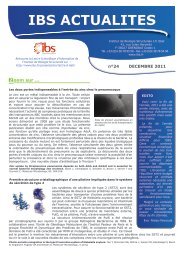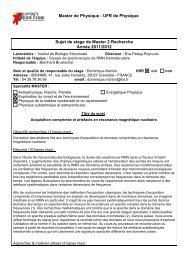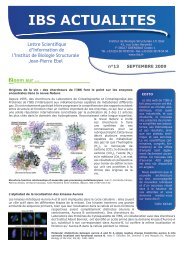Master de Physique ou de Nanosciences Nanotechnologie - UFR ...
Master de Physique ou de Nanosciences Nanotechnologie - UFR ...
Master de Physique ou de Nanosciences Nanotechnologie - UFR ...
Create successful ePaper yourself
Turn your PDF publications into a flip-book with our unique Google optimized e-Paper software.
___________________________________________________<br />
<strong>Master</strong> <strong>de</strong> <strong>Physique</strong> <strong>ou</strong> <strong>de</strong> <strong>Nanosciences</strong> <strong>Nanotechnologie</strong> - <strong>UFR</strong> Phitem<br />
Sujet <strong>de</strong> stage proposé<br />
Laboratoire : Institut <strong>de</strong> Biologie Structurale Jean-Pierre Ebel<br />
Directeur : Eva Pebay-Peyr<strong>ou</strong>la<br />
Intitulé <strong>de</strong> l'équipe : CHANNELS<br />
Responsable : Michel VIVAUDOU<br />
Nom et Qualité du Responsable du Stage : Christophe MOREAU<br />
HDR (<strong>ou</strong>i <strong>ou</strong> non) : non<br />
Adresse : Institut <strong>de</strong> Biologie Structurale – 41 rue Jules Horowitz – 38027 Grenoble Ce<strong>de</strong>x 1<br />
Tél : 04.38.78.48.67<br />
Email : christophe.moreau@ibs.fr<br />
Spécialité MASTER (à choisir parmi Exploration du Vivant et <strong>de</strong> l’Environnement (EVE),<br />
Nanophysique, Nanostructures (NN), <strong>Physique</strong> <strong>de</strong> la Matière Con<strong>de</strong>nsée et du Rayonnement<br />
(PMCR)): EVE<br />
Titre du sujet : Structure-function studies of Biosensors Engineered by Assembly of Receptors and Ion<br />
Channels<br />
Objectifs visés du stage (5 lignes max) :<br />
Ce stage aura p<strong>ou</strong>r objectif <strong>de</strong> mieux comprendre les mécanismes moléculaires g<strong>ou</strong>vernant une protéine<br />
<strong>de</strong> fusion entre un récepteur membranaire et un canal ionique en utilisant une approche structurefonction.<br />
Intérêts pédagogiques et compétences visées (5 lignes max) :<br />
L'intérêt pédagogique <strong>de</strong> ce stage est <strong>de</strong> réaliser un sujet <strong>de</strong> la conception <strong>de</strong>s protéines modifiées par<br />
génie génétique à leur caractérisation physiologique. L'étudiant(e) acquerra une compétence technique<br />
dans ces domaines et développera son autonomie en évoluant au sein d'une équipe internationale.<br />
Résumé du sujet <strong>de</strong> stage :<br />
We have <strong>de</strong>vised a novel type of bio-inspired sensors, Ion-Channel C<strong>ou</strong>pled Receptors (ICCR), based on<br />
the fusion of receptors with an ion channel serving as an electrical probe. Binding of a ligand to the receptor<br />
triggers opening of the associated ion channel and an increased ion flux that is easily <strong>de</strong>tectable using<br />
existing electrophysiological techniques. This concept was validated by the creation of ICCRs between a<br />
potassium channel and several G-protein c<strong>ou</strong>pled receptors (GPCR). The <strong>Master</strong> internship shall concern<br />
the structure-function study of receptor-channel interactions in existing ICCRs. Work will involve molecular<br />
engineering and biophysics (electrophysiology). It sh<strong>ou</strong>ld establish the f<strong>ou</strong>ndation of high-performance<br />
bioelectrical sensors while providing a better un<strong>de</strong>rstanding of the molecular mechanisms of GPCR<br />
activation and ion channel gating. Alth<strong>ou</strong>gh this project has a strong biotechnological flavor, the approach<br />
shall remain very fundamental with a strong focus on the structure and function of membrane proteins and<br />
on their interactions.<br />
Références afférentes au sujet <strong>de</strong> stage :<br />
- Moreau CJ et al. (2008) Nature Nanotech., 3:620-5.<br />
- Caro LN et al. (2011) PloS ONE, 6:e18226.<br />
Approches & matériels utilisés (5 lignes max) :<br />
1
L'équipe possè<strong>de</strong> une expertise dans l'ingénierie <strong>de</strong>s protéines par génie génétique et la caractérisation<br />
électrophysiologique <strong>de</strong>s canaux ioniques. Les techniques utilisées incluent la mutagenèse dirigée et la<br />
fusion <strong>de</strong> gènes par PCR classiques et particulières (avec megaprimers), ainsi que la synthèse in vitro<br />
d'ARNm, la micro-injection <strong>de</strong>s ARNm dans les ovocytes <strong>de</strong> Xénope et la caractérisation fonctionnelle <strong>de</strong>s<br />
canaux ioniques par les techniques <strong>de</strong> d<strong>ou</strong>ble-electro<strong>de</strong> et <strong>de</strong> patch-clamp.<br />
Domaines <strong>de</strong> compétences s<strong>ou</strong>haitées du candidat (3 lignes max):<br />
Le <strong>ou</strong> la candidat(e) <strong>de</strong>vra faire preuve <strong>de</strong> beauc<strong>ou</strong>p <strong>de</strong> rigueur dans la réalisation et le suivi <strong>de</strong>s<br />
expériences et être capable <strong>de</strong> communiquer à l'écrit et à l'oral en anglais (l'équipe d'accueil est<br />
composée <strong>de</strong> membres non francophones).<br />
Le sujet peut-il donner lieu à une p<strong>ou</strong>rsuite en thèse ? <strong>ou</strong>i<br />
Dates du stage : Mars-Juin 2013<br />
2



